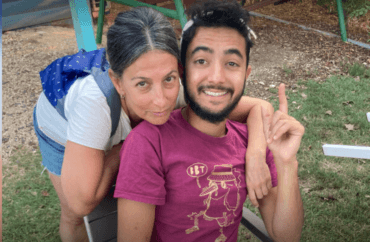Elisheva Rishon: A Black Jew Speaks About Her Antisemitic Experiences
We often hear about the racism that Black people in America face, but rarely about the antisemitism and racism Black Jews face. In honor of Black History Month, Allison Josephs spoke with Elisheva Rishon, a Black Orthodox Jewish woman about her experience in both communities — she’s a part of each one yet an outsider as well. Her mission now is to build bridges between the Black and Jewish communities by promoting awareness, education, and agency on her social media platforms.
Elisheva was born and raised in the Orthodox Jewish community in Crown Heights and Flatbush and was one of the few Black families in the neighborhoods. She experienced anti-Blackness throughout her time there and recalls not wanting to go to shul (synagogue) on Shabbat because the other attendees would turn around and stare at her and her family like they “were zoo animals.”
Elisheva also experienced anti-Jewishness just walking down the street with her family. Her father and brothers looked identifiably Jewish in their black hats and “non-Jewish people driving in their cars would also stare and point at us as if we were zoo animals” she says. “We were like a spectacle for the whole world [wherever we went]. I just hated that kind of feeling.”
Elisheva’s most shocking anti-Black experience happened in shul when the rabbi made accusations that her family was not Jewish in front of the congregation. None of the congregants spoke out against the rabbi’s claims. Years later, Elisheva met a couple who witnessed the rabbi’s sermon. The husband expressed his remorse and regretted not standing up for her. Elisheva says, this was the “perfect situation of someone who was indifferent, [yet] who wanted to move forward, who was apologizing and wanted to make a difference.”
Elisheva is trying to reach the ‘sideliners’ on social media because “the majority of people want to do something, but they do not know how so they stay on the sidelines.” While there are some people who may be racist, she believes that is the minority and she says, “the majority of people are indifferent” so they do not speak up. She believes that proper education, exposure, and communication will get people to stand up and fight for what is right.
Despite the stares and hateful comments directed towards Elisheva and her family, the Crown Heights riot was her first real exposure to anti-Semitism. The race riot took place in 1991 and for two days Black residents attacked Orthodox residents, damaging their homes and looting their businesses. In one instance, rocks were thrown through the window of her family’s home. Her father ran out to yell at the perpetrators only to discover that they were his students from the local public school. Shocked and mortified, they ran away, thinking it was just a Jewish home, not their teacher’s house.
The animosity between the two groups was so strong that both communities would get angry if they saw someone helping the other side. Elisheva says, “in that moment in time, I felt like no one had my back.” She believes it was the “worst moment, in modern day American history. It was the moment that two communities should have been working together but were not.”
Elisheva believes the Orthodox and Black communities are in opposition because of the lies that the white supremacists have whispered into American culture over the years. There are misconceptions that Jews are wealthy, arrogant, and racist, while many families that Elisheva grew up with lived on food stamps. Elisheva also says that Orthodox Jews only seems xenophobic due to the “trauma that happened through the generations which led to the distrust of the outside world” resulting in them sticking within their own community.
This is retuned by false beliefs that the Black community is full of criminals. There is also the misunderstanding that the teachings of Louis Farrakhan, who is a Black Islamic anti-Semite who views Jews as termites, are greatly accepted in the Black community. Elisheva says only a “tiny minority in the Black American community listen to him, the rest of us call him a clown.”
The lies have made the communities drift apart from the once strong connection they shared. Elisheva says, in the past they were united and changed the country because “we are connected in our struggles.” “Anti-Semitism and anti-Blackness come from the same evil,” she continues. “It is all a part of white supremacy.” When the Black community and Jewish community come together, change is bound to occur for the better, like when Martin Luther King Jr. and Rabbi Maurice Davis who walked together in Selma for equal rights.
Elisheva deconstructs the inaccurate assumptions and restores the relationship Jews and Black people once had by spreading positive messages about both communities. She expresses her love for Judaism and empowers other Black Jewish females who have gone through similar experiences as her to stay strong. She also provides information to invigorate people on the sidelines.
While Elisheva has accomplished great feats, she has experienced the ugly side of being an influencer. She receives many hateful comments online and has been called many derogatory terms like, “the N word and the K word,” says Elisheva. The most appalling comment she has received was, “you would have been at the back of the oven” in refence to the Holocaust but with an added twist for being Black.
She will not be deterred though. To counterbalance the toxicity on social media, she asks her followers to post positive messages to drown out the hateful words. Elisheva also reminds herself why she joined social media in the first place, and that helps reaffirm her mission.
Elisheva’s final message is full of hope for the future. She says, “I have nothing but love for the Jewish American community, the Orthodox Jewish American community and the Black American community. I speak [out] so we can do better in the future.” Elisheva believes the communities have gone through many hardships and together, positive changes can be achieved.
If you found this content meaningful and want to help further our mission through our Keter, Makom, and Tikun branches, please consider becoming a Change Maker today.









